- 相關(guān)推薦
英語手抄報資料之新年快樂
在日常學(xué)習(xí)、工作生活中,大家一定沒少看到經(jīng)典的手抄報吧,通過手抄報的制作能有效鍛煉我們搜集信息、篩選信息的能力.那些被廣泛運(yùn)用的手抄報都是什么樣子的呢?以下是小編精心整理的英語手抄報資料之新年快樂,歡迎閱讀,希望大家能夠喜歡。
英語手抄報資料之新年快樂
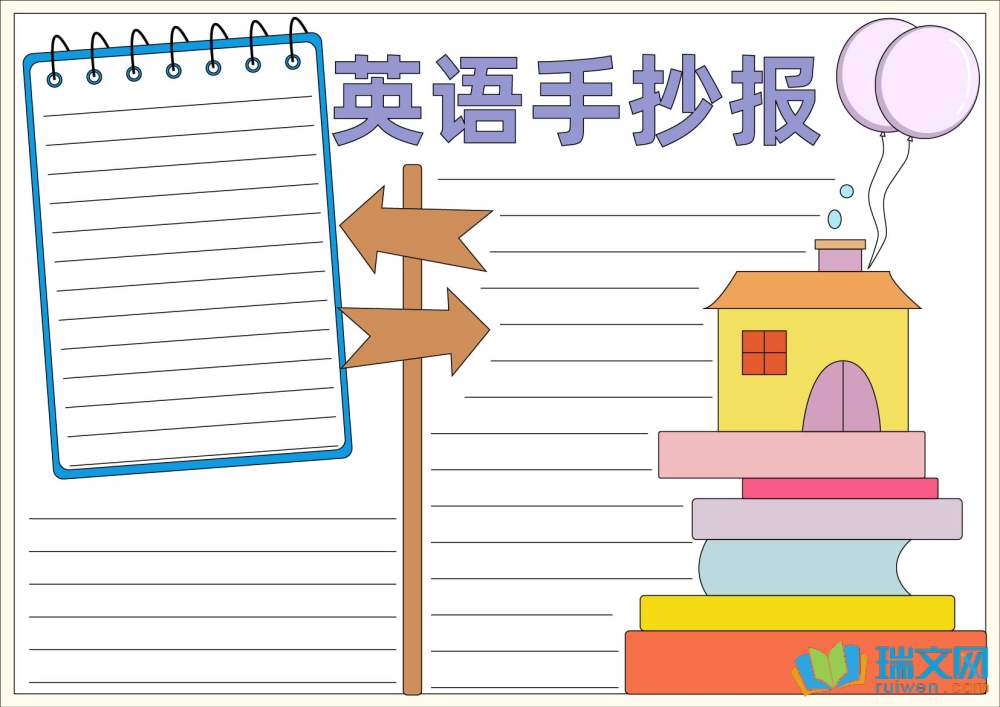
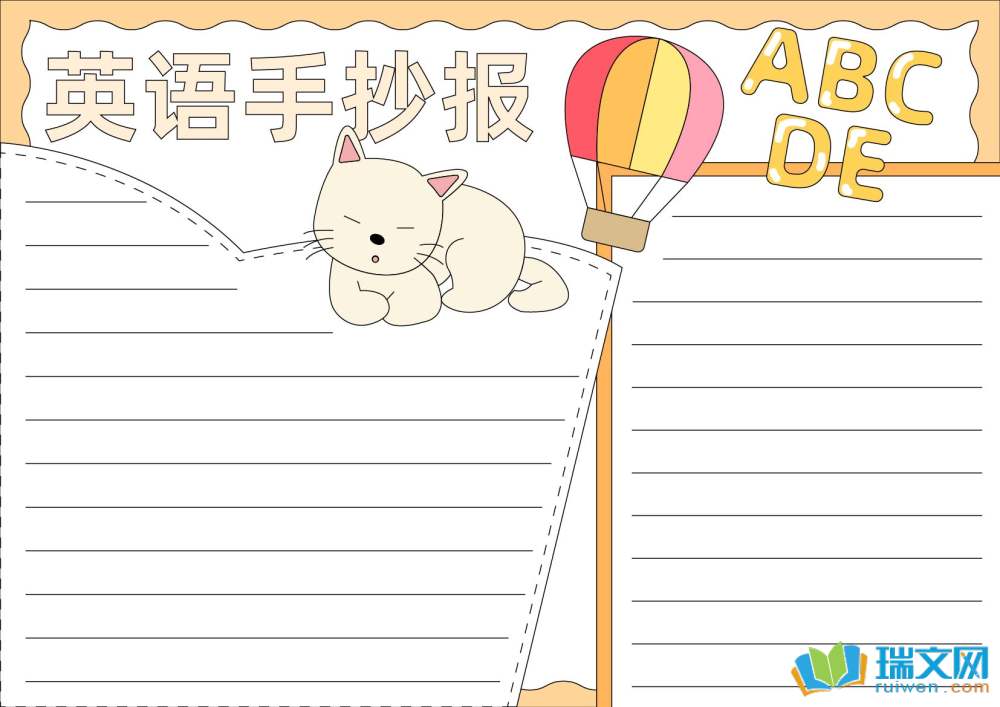
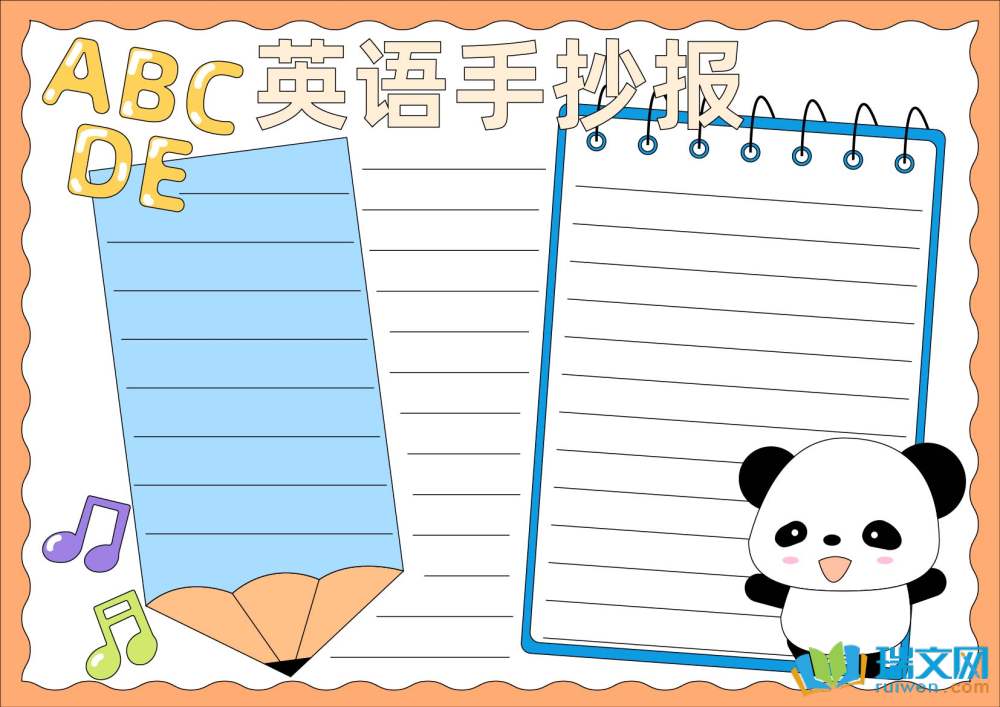
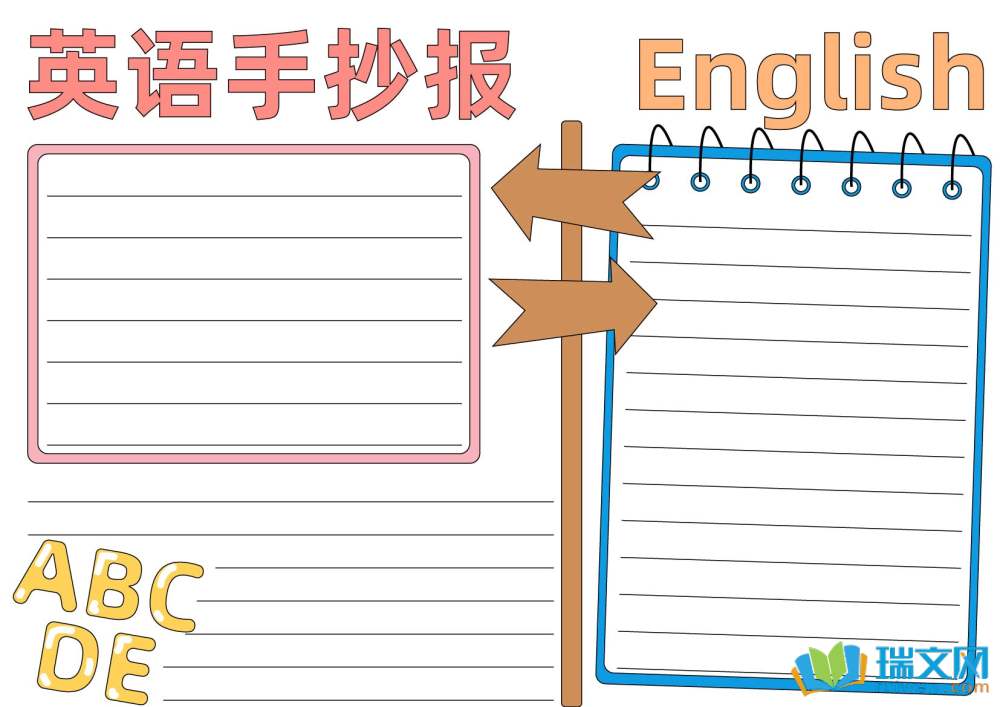
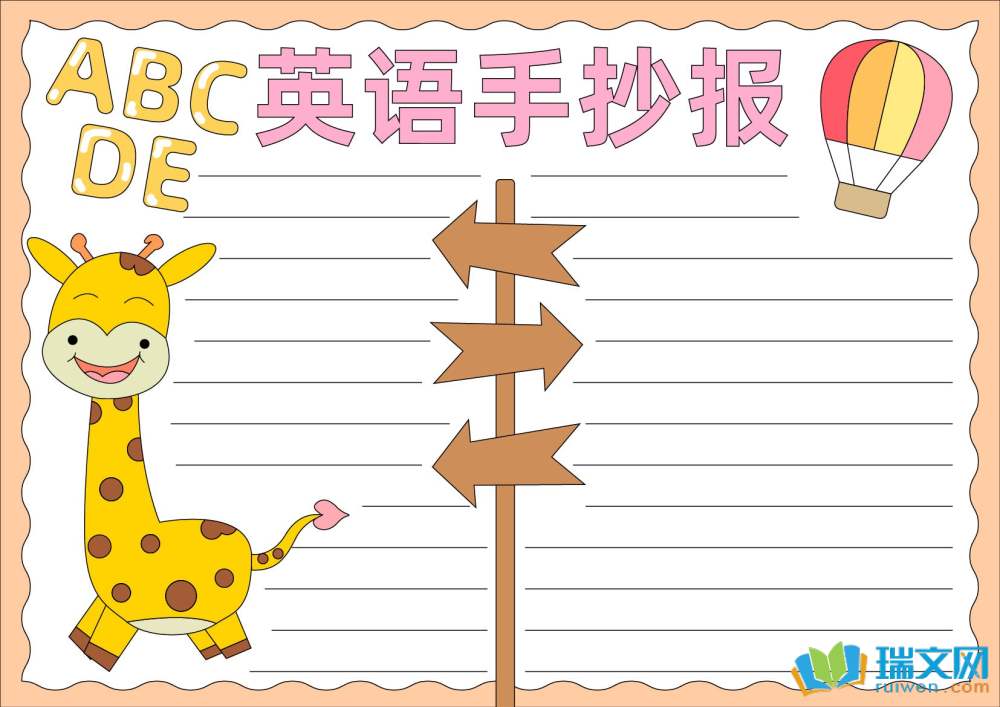
新年快樂英語作文
January 1st is New Years Day.
Its a great day for all the people throughout the world. As the saying goes, "A good beginning is half the battle". So, many people go all out to celebrate the important day. On that day, I went to the Book City with my classmates.
We bought a lot of useful reference books and interesting story books. I believe "Knowledge is power". I hope I can learn a lot from these books and improve my study. In the evening, my family had a big dinner party.
All the members in my family wished me a good luck in the new year.
春節(jié)祝福語
祝愿父母身體安康
I wish you longevity and health.
愿您福壽安康。
Wishing you a long life.
愿您長命百歲。
May you both live long and healthy lives.
愿二老福壽安康。
Wishing a happy, long and healthy life!
多福多壽!
祈祝愛情歷久彌新
You are as refreshing as the upcoming spring.
春天就要來了,你就像春天一樣清新可人。
I love you more with every passing year.
歲月流逝,我對你的愛歷久彌新。
You are the most precious thing I have!
你是我最珍愛的寶貝!
Although I grow older every passing year, I am forever young when I am around you.
歲月已過,容顏已老。但有你在身旁,我將青春永不老。
祝愿同事步步高升
I hope there will be a promotion for you this year.
愿您今年步步高升。
Wishing you many future successes.
祝您今后獲得更大成就。
Wishing you success in your career and a happy family!
祝您事業(yè)、家庭雙豐收。
I wish you a joyous new year, happiness and good luck in the future.
祝新年快樂,并愿您幸福吉祥、前程似錦。
祈祝友人生意興隆
Have a happy and prosperous year.
愿您新年快樂,大發(fā)利市。
Good luck in your new business.
恭賀開張大吉!
Best wishes for the success of your business.
祝您生意更加興隆。
May good fortune come your way in the new year.
恭喜發(fā)財!
祝福常用語
Good luck, good health, good cheer. I wish you a happy New Year.
祝好運(yùn)、健康、歡樂伴你度過一個快樂新年。
With best wishes for a happy New Year!
祝新年快樂,并致以良好的祝愿!
I hope you have a most happy and prosperous New Year.
謹(jǐn)祝新年快樂幸福,大吉大利。
With the compliments of the season.
祝賀佳節(jié)。
May the seasons joy fill you all the year round.
愿節(jié)日的愉快伴你一生。
Seasons greetings and best wishes for the New Year.
新年快樂、最誠摯的祝福。
To wish you joy at this holy season. Wishing every happiness will always be with you.
恭祝新年吉祥,幸福和歡樂與你同在。
Good health, good luck and much happiness throughout the year.
身體健康、萬事好運(yùn)、來年幸福滿滿!
May the joy and happiness around you today and always.
愿快樂幸福永伴你左右。
Please accept my sincere wishes for the New Year. I hope you will continue to enjoy good health.
請接受我誠摯的新年,順祝身體健康。
Allow me to congratulate you on the arrival of the New Year and to extend to you all my best wishes for your perfect health and lasting prosperity.
恭賀新禧,祝身體健康、事業(yè)發(fā)達(dá)。
Best wishes for the holidays and happiness throughout the New Year.
恭賀新禧,萬事如意。
With very best wishes for your happiness in the New Year.
致以最良好的,原你新年快樂幸福。
May the coming New Year bring you joy, love and peace.
愿新年為你帶來快樂,友愛和寧靜。
Wishing you happiness during the holidays and throughout the New Year.
祝節(jié)日快樂,新年幸福。
Seasons greetings and sincere wishes for a bright and happy New Year!
獻(xiàn)上節(jié)日的問候與,愿你擁有一個充滿生機(jī)和歡樂的新年。
I give you endless brand-new good wishes. Please accept them as a new remembrance of our lasting friendship.
給你我無盡的新的,讓它們成為我們永恒友誼的新的紀(jì)念。
Good luck and at success in the coming New Year.
祝來年好運(yùn),并取得更大的成就。
A beautiful wish to you and your family --- live a happy life and everything goes well.
給你和你的家人最美好的祝愿——生活幸福、萬事如意!
Allow me to congratulate you on the arrival of the New Year and to extend to you all my best wishes for your perfect health and lasting prosperity.
恭賀新禧,祝身體健康、事業(yè)發(fā)達(dá)。
Good luck and great success in the coming New Year.
祝來年好運(yùn),并取得更大的成就。
I hope you have a most happy and prosperous New Year.
謹(jǐn)祝新年快樂幸福,大吉大利。
春節(jié)簡介
Chinese Spring Festival, also called Lunar New Year, has more than 4,000 years of history. Being one of the traditional Chinese festivals, it is the grandest and the most important festival for Chinese people. It is also the time for the whole families to get together, which is similar with Christmas Day to the westerners. Originating during the Shang Dynasty (about 17th - 11th century BC), Spring Festival, which celebrates family reunion, is full of rich and colorful activities, and hopes with the advent of spring and flowers blossoming. People from different regions and different ethnic groups celebrate it in their unique ways.
中國的春節(jié),也被稱為農(nóng)歷新年,迄今已有四千多年的歷史。對于中國人來說,這是規(guī)模最大,最重要的傳統(tǒng)節(jié)日。就如同西方的圣誕節(jié)一樣,春節(jié)是一家團(tuán)聚的日子。春節(jié)起源于商朝(公元前11-17世紀(jì)),為了慶祝全家團(tuán)圓和表達(dá)對春暖花開的期盼,節(jié)日期間會準(zhǔn)備豐富多彩的活動。不同地區(qū)和不同少數(shù)民族人們會用自己獨(dú)特的方式慶祝這一傳統(tǒng)節(jié)日。
節(jié)日時長
It comes on the first day of Chinese lunar calendar and lasts for almost half of a month. But in folk custom, this traditional holiday lasts from the 23rd day of the twelfth month to the 15th day of the first month (Lantern Festival) in the lunar calendar. Among these days, the New Year’s Eve and the first day of the New Year is the peak time. The exact days are different in every year according to the lunar calendar.
春節(jié)從農(nóng)歷新年第一天開始,幾乎要持續(xù)一整個月。但在民間傳統(tǒng)中,這一節(jié)日從臘月23日就開始了,直到正月十五(元宵節(jié))。在這些天里,除夕和春節(jié)第一天是最熱鬧的時候。根據(jù)農(nóng)歷,每年除夕和春節(jié)所在的公歷日期都有所不同。
春節(jié)由來
It is said that the custom of Spring Festival started in when people offered sacrifice to ancestors in the last month of Chinese lunar calendar. At that time, people prepared the sacrifice by doing thorough cleaning, having bathes and so on. Later, people began to worship different deities as well on that day. It is the time that almost all the farm works were done and people have free time. The sacrificing time changed according to the farming schedule and was not fixed until the Han Dynasty (202BC-220AD). The customs of worshipping deities and ancestors remains even though the ceremonies are not as grand as before. It is also the time that spring is coming, so people held all kinds of ceremonies to welcome it.
據(jù)說,春節(jié)起初源于人們在農(nóng)歷臘月祭祀先祖,在那期間,人們?yōu)榱思漓霑龃髵叱逶Q衣等等。后來人們開始在那一天敬奉神明。春節(jié)期間正好各種農(nóng)耕活動結(jié)束,人們有空余時間。最開始的祭祀日期由于農(nóng)耕活動并不固定,直到漢朝(公元前202年-公元220年)才固定下來。祭祀神明和先祖的傳統(tǒng)延續(xù)下來,但并不像以前那樣浩大。春節(jié)也是春天的開始,所以人們會舉辦各種儀式迎接春天的`到來。
春節(jié)傳說
There are many legends about Spring Festival in Chinese culture. In folk culture, it is also called “guonian” (meaning “passing a year”). It is said that the “nian” (year) was a strong monster which was fierce and cruel and ate one kind of animal including human being a day. Human beings were scared about it and had to hide on the evening when the “nian” came out. Later, people found that “nian” was very scared about the red color and fireworks. So after that, people use red color and fireworks or firecrackers to drive away “nian”. As a result, the custom of using red color and setting off fireworks remains.
中國文化中有很多關(guān)于春節(jié)的傳說。在傳統(tǒng)文化中,春節(jié)亦被稱為“過年”。傳說“年”是一種兇猛異常的怪物,每天都會吃一種動物(包括人)。人們非常懼怕他,當(dāng)“年”夜間出來活動時,人們會找地方躲起來。后來,人們發(fā)現(xiàn)“年”非常害怕紅色和爆竹,于是,人們用紅色和鞭炮來驅(qū)趕“年”。久而久之,春節(jié)用大紅色和放鞭炮的習(xí)俗就保留了下來。
春節(jié)活動
Preparing the New Year starts 7 days before the New Year’s Eve. According to Chinese lunar calendar, people start to clean the house on Dec. 24, butcher on Dec. 26th and so on. People have certain things to do on each day. These activities will end Jan. 15th of the lunar calendar.
新年的準(zhǔn)備工作在除夕前的七天就開始了。根據(jù)中國農(nóng)歷,人們從臘月二十四開始打掃屋子,二十六日殺豬宰羊等等。每一天都有不同的活動,所有這些活動將在正月十五結(jié)束。
傳統(tǒng)習(xí)俗
Every family does a thorough house cleaning and purchases enough food, including fish, meat, roasted nuts and seeds, all kinds of candies and fruits, etc, for the festival period. Also, new clothes must be bought, especially for children. Red scrolls with complementary poetic couplets, one line on each side of the gate, are pasted at every gate. The Chinese character Fu is pasted on the center of the door and paper-cut pictures adorn windows.
過年期間,每家每戶都會做大掃除,購買豐富的食物,包括魚肉堅果,水果糖果等。另外,春節(jié)必須買新衣服,尤其是給小孩子購買。門上貼上新對聯(lián)和福字,窗戶上還要貼上窗花。
春節(jié)禁忌
The Spring Festival is a start for a new year, so it is regarded as the omen of a year. People have many taboos during this period. Many bad words related to “death”, “broken”, “killing”, “ghost” and “illness” or “sickness” are forbidden during conversations. In some places, there are more specific details. They consider it unlucky if the barrel of rice is empty, because they think they will have nothing to eat in the next year. Taking medicine is forbidden on this day, otherwise, people will have sick for the whole year and take medicine constantly.
春節(jié)是新的一年的`開始,預(yù)示著一年的運(yùn)氣,所以過年期間有很多禁忌,比如“死”“破”“殺”“鬼”“病”這類字眼是談話中要避免的`。在某些地方還有一些特殊的禁忌,比如新年米缸空了不是好兆頭,因?yàn)檫@預(yù)示著新的一年將沒東西吃,春節(jié)那天也不能吃藥,這會預(yù)示著新的一年疾病產(chǎn)生,醫(yī)藥不斷。
節(jié)日美食
Food during this happy event has its characteristics, which is the representative of Chinese festival food culture. Dumplings and the reunion dinner are indispensable at this time. Cold and hot dishes are all served. Fish is always an important dish then, which expresses people’s hope of having a wealthy year.
春節(jié)期間的食物也很有特色,代表著中國傳統(tǒng)飲食文化,餃子和團(tuán)圓飯是不可或缺的,冷盤熱菜都得上,魚也是春節(jié)一道重要的菜肴,它代表了人們年年有余的期望。